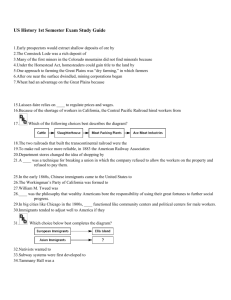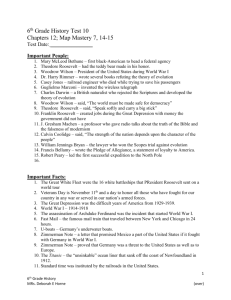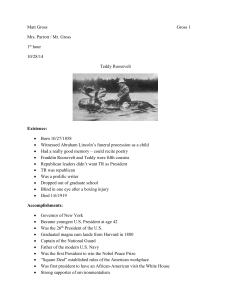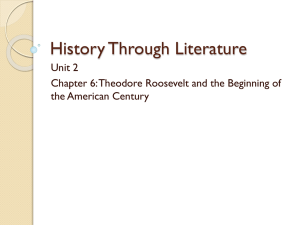Lesson 3 – Civic Engagement – Theodore Roosevelt Audience: 5th
advertisement
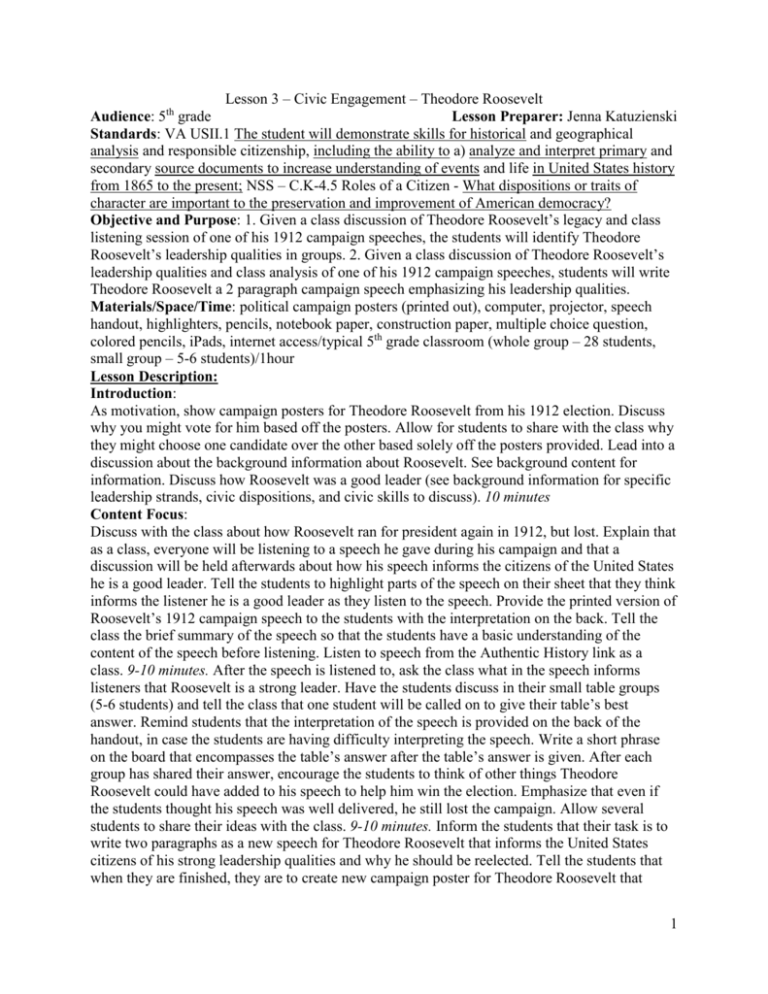
Lesson 3 – Civic Engagement – Theodore Roosevelt Audience: 5 grade Lesson Preparer: Jenna Katuzienski Standards: VA USII.1 The student will demonstrate skills for historical and geographical analysis and responsible citizenship, including the ability to a) analyze and interpret primary and secondary source documents to increase understanding of events and life in United States history from 1865 to the present; NSS – C.K-4.5 Roles of a Citizen - What dispositions or traits of character are important to the preservation and improvement of American democracy? Objective and Purpose: 1. Given a class discussion of Theodore Roosevelt’s legacy and class listening session of one of his 1912 campaign speeches, the students will identify Theodore Roosevelt’s leadership qualities in groups. 2. Given a class discussion of Theodore Roosevelt’s leadership qualities and class analysis of one of his 1912 campaign speeches, students will write Theodore Roosevelt a 2 paragraph campaign speech emphasizing his leadership qualities. Materials/Space/Time: political campaign posters (printed out), computer, projector, speech handout, highlighters, pencils, notebook paper, construction paper, multiple choice question, colored pencils, iPads, internet access/typical 5th grade classroom (whole group – 28 students, small group – 5-6 students)/1hour Lesson Description: Introduction: As motivation, show campaign posters for Theodore Roosevelt from his 1912 election. Discuss why you might vote for him based off the posters. Allow for students to share with the class why they might choose one candidate over the other based solely off the posters provided. Lead into a discussion about the background information about Roosevelt. See background content for information. Discuss how Roosevelt was a good leader (see background information for specific leadership strands, civic dispositions, and civic skills to discuss). 10 minutes Content Focus: Discuss with the class about how Roosevelt ran for president again in 1912, but lost. Explain that as a class, everyone will be listening to a speech he gave during his campaign and that a discussion will be held afterwards about how his speech informs the citizens of the United States he is a good leader. Tell the students to highlight parts of the speech on their sheet that they think informs the listener he is a good leader as they listen to the speech. Provide the printed version of Roosevelt’s 1912 campaign speech to the students with the interpretation on the back. Tell the class the brief summary of the speech so that the students have a basic understanding of the content of the speech before listening. Listen to speech from the Authentic History link as a class. 9-10 minutes. After the speech is listened to, ask the class what in the speech informs listeners that Roosevelt is a strong leader. Have the students discuss in their small table groups (5-6 students) and tell the class that one student will be called on to give their table’s best answer. Remind students that the interpretation of the speech is provided on the back of the handout, in case the students are having difficulty interpreting the speech. Write a short phrase on the board that encompasses the table’s answer after the table’s answer is given. After each group has shared their answer, encourage the students to think of other things Theodore Roosevelt could have added to his speech to help him win the election. Emphasize that even if the students thought his speech was well delivered, he still lost the campaign. Allow several students to share their ideas with the class. 9-10 minutes. Inform the students that their task is to write two paragraphs as a new speech for Theodore Roosevelt that informs the United States citizens of his strong leadership qualities and why he should be reelected. Tell the students that when they are finished, they are to create new campaign poster for Theodore Roosevelt that th 1 supports the leadership qualities identified in the created speech. Tell the students that their speech and campaign poster should focus on at least 2 leadership qualities of Theodore Roosevelt. Explain that students will work individually on their speech and poster. Remind the students that the leadership qualities identified from the original speech are displayed on the board to help the students think of new ideas for their speeches. Inform the students that they must first write their speech before starting their campaign poster. Allow students to work individually at their desks. When students believe that they are finished with their speech, provide them with a piece of construction paper and tell them to use their own colored pencils to create their campaign poster. Provide the students with who need extra help with one-on-one attention after directing the class. 25 minutes. Closure: Ask the students to share a sentence or two from their speech with the class that highlights a leadership quality of Theodore Roosevelt. Allow each student to share with the class, although students who do not wish to share should not be forced. Distribute the multiple choice question as an exit ticket of class and collect the speeches and questions in the basket at the front of the classroom as the students leave. 5-8 minutes. Extension: As a follow-up lesson, have students perform their written speeches for the teacher in the alcove outside the classroom while the other students. Allow the rest of the students to practice performing their speeches to themselves in the classroom and to make final touches to their campaign posters, if needed. Record the student’s voice with the teacher iPad. Present the students’ speeches and campaign posters to the class and have the students identify the leadership qualities presented in each speech. Evaluation Formative: Observations of student participation during discussions in small groups and with their partners while creating their speech and campaign posters. Summative: Students will work individually to write a speech for Theodore Roosevelt and to create a campaign poster in conjunction with the speech. Above expectations for the speech would consist of including background content about Theodore Roosevelt and highlighting at least 3 leadership qualities of his in the created speech. Above expectations of the poster would include 3 leadership qualities in conjunction with the created speech. Meeting expectations would consist of little background information about Theodore Roosevelt and highlighting only 1 to 2 leadership qualities in the created speech. Meeting expectations for the poster would include 2 leadership qualities identified in the speech. Below expectations would consist of no background information and 1 to no leadership qualities highlighted in the speech created and no completion of a campaign poster. The final multiple choice question also serves as a summative evaluation for each individual student. 2 Background Content: Theodore Roosevelt, often referred to as Teddy, was born on October 21, 1858. He spent his childhood in New York and as a child he liked to read and draw. He also had a strong interest in animals which lead to him having many household pets. He went to Harvard University in 1876 where he met his wife, Alice. His wife died 4 years later after giving birth to his daughter. He was very sad and moved out west, leaving his daughter with his sister. He bought a ranch out west and enjoyed riding horses and looking at the landscape. In 1895, Teddy returned to New York he we led a corrupt police commission to become more honest and trustworthy. In 1897, President William McKinley selected Teddy to be assistant secretary of the navy. Teddy quit this job when war was declared in 1898 and gathered 1,000 volunteers to form the Rough Riders. The Rough Riders fought in the Spanish-American War in Cuba, making Teddy Roosevelt a hero. After returning from Cuba, he was elected governor of New York. As governor, he helped fixed many unfair and corrupt businesses in the state. He also passed laws to improve housing and working conditions of the people. in 1900, he was elected as vice president for McKinley. However, one year later McKinley was shot, leaving Teddy as president. He was reelected in 1904. In both of his presidential terms, Teddy was able to help set up the national parks and forests in the country, helped rid corrupt businesses, helped build the United States as a global power, built the Panama Canal, and acted as a peacemaker between Russia and Japan in 1904. He earned the Nobel Peace Prize in 1906. Teddy was also a strong advocate for immigrants’ equality in the United States. He believed that immigrants come to the United States for a good reason and believed that immigrants should adjust to American cultures. He is quoted saying that “[immigrants] should be treated on an exact equality with everyone else, for it is an outrage to discriminate against any such man because of creed, or birthplace, or origin.” Teddy supported William Howard Taft in the 1908 election, but disagreed with how he ran things in office. Teddy ran for election again in 1912. Unfortunately, he lost to Woodrow Wilson. Teddy Roosevelt was still happy with the fact that he stated his position to the American people. He soon became very ill and died on January 6, 1919, leaving Americans very sad. Teddy was known for his energetic look on life and big smile. He is also thought to be the United States first environmentalist president. He had a significant impact on the global view of the United States as a global power. Roosevelt exhibits civic dispositions by respecting individual worth and human dignity by advocating for immigrants and fighting for better working and living conditions for the people of New York as governor. Leadership strands addressed by Roosevelt include defining knowledge of self and others. Roosevelt demonstrates that he has knowledge of himself and others in the country and world and proceeds to use this to establish the United States as a global power. He also practices leadership through service, as demonstrated in his 1912 campaign speech. He explicitly states that he will carry out the will of the people and do exactly as they want, offering is services to the people completely. He also volunteered to fight in the Spanish-American War, bringing 1,000 other volunteers with him. 3 References: Civics K-4. (n.d.). Retrieved November 5, 2014, from http://www.educationworld.com/standards/national/soc_sci/civics/k_4.shtml Election of 1912. (n.d.). Retrieved November 5, 2014, from http://americanpoliticalbuttons.com/election-of-1912.html Elish, Dan. Theodore Roosevelt. New York: Marshall Cavendish Benchmark, 2008. Print. Hollihan, Kerrie Logan. Theodore Roosevelt for Kids: His Life and Times, 21 Activities. Chicago, IL: Chicago Review, 2010. Print Ithaca College. (n.d.). Retrieved November 5, 2014, from http://www.ithaca.edu/rhp/programs/cmd/blogs/posters_and_election_propaganda/the_u.s._electi on_of_1912:_a_watershed_for_the_cam/#.VFmhWmOrSSo Potts, Steve. Theodore Roosevelt: A Photo-illustrated Biography. Mankato, MN: Bridgestone, 1996. Print. Progressive covenant with the people | Library of Congress. (n.d.). Retrieved November 5, 2014, from http://www.loc.gov/item/99391565/ Rappaport, Doreen, and C. Payne F. To Dare Mighty Things: The Life of Theodore Roosevelt. Print. The Progressive Covenant With The People, by Theodore Roosevelt (1912). (n.d.). Retrieved November 5, 2014, from http://www.authentichistory.com/1898-1913/2-progressivism/5wilson/19120800_Progressive_Covenant_With_The_People-Theodore_Roosevelt.html Theodore Roosevelt On Immigrants. (n.d.). Retrieved November 5, 2014, from http://politicalvelcraft.org/2012/09/14/theodore-roosevelt-on-immigrants/ Theodore Roosevelt. (n.d.). Retrieved November 5, 2014, from http://www.biography.com/people/theodore-roosevelt-9463424#death-and-legacy Link to be used to listen to the 1912 campaign speech: http://www.authentichistory.com/1898-1913/2-progressivism/5wilson/19120800_Progressive_Covenant_With_The_People-Theodore_Roosevelt.html 4 The Progressive Covenant With The People Performed by Theodore Roosevelt Recorded August 1912 Political parties exist to secure responsible government and to execute the will of the people. From these great tasks both of the old parties have turned aside. Instead of instruments to promote the general welfare they have become the tools of corrupt interests, which use them impartially to serve their selfish purposes. Behind the ostensible government sits enthroned an invisible government owing no allegiance and acknowledging no responsibility to the people. To destroy this invisible government, to dissolve the unholy alliance between corrupt business and corrupt politics, is the first task of the statesmanship of the day. Unhampered by tradition, uncorrupted by power, undismayed by the magnitude of the task, the new party offers itself as the instrument of the people, to sweep away old abuses, to build a new and nobler government. This declaration is our convenant with the people and we hereby bind the party and its candidates, in state and nation, to the pledges made herein. With all my heart and soul, with every particle of high purpose that is within me, I pledge you my word to do everything I can to put every particle of courage, of common sense, and of strength that I have at your disposal, and to endeavor so far as strength has given me to live up to the obligations you have put upon me, and to endeavor to carry out in the interest of our whole people the policies to which you have today solemnly dedicated yourselves in the name of the millions of men and women for whom you speak. Surely there never was a fight better worth making than the one in which we are engaged. It little matters what befalls any one of us who for the time being stand in the forefront of the battle. I hope we shall win, and I believe that if we can wake the people to what the fight really means, we shall win. But win or lose, we shall not falter. Whatever fate may at the moment overtake any of us, the movement itself will not stop. Our cause is based on the eternal principles of righteousness; even though we who now lead may for the time fail, in the end the cause itself shall triumph. Six weeks ago, here in Chicago, I spoke to the honest representatives of a convention which was not dominated by honest men. A convention wherein sat, alas, a majority of men who, with sneering indifference to every principle of right, so acted as to bring to a shameful end a party which had been founded over half a century ago by men in whose souls burned the fire of lofty endeavor. Now to you men, who, in your turn, have come together to spend and be spent in the endless crusade against wrong, to you who face the future resolute and confident, to you who strive in a spirit of brotherhood for the betterment of our nation, to you who gird yourselves for this great new fight in the never-ending warfare for the good of humankind, I say in closing what in that speech I said in closing: we stand at Armageddon, and we battle for the Lord. 5 Interpretation of The Progressive Covenant With The People Performed by Theodore Roosevelt Recorded August 1912 There are political parties to protect the people and do what the people want them to. This is not what the political parties have been doing. Instead of helping and protecting people by doing what the people want them to, they have been corrupt and only care about what they want to do. Everyone thinks the government is honest to the people, but it is really not. The person who will be elected will try to get rid of this bad government that has a corrupt relationship with business and politics. The new political party is not corrupt like the old political party and wants to help the USA by getting rid of all the bad things that have happened and make a better new government. This is our promise to the people of the United States as the new party to be elected to office. I will do everything I possibly can to live up to the expectations the people have of me and to do exactly as the people want me to in office. There has never been a fight that was more important than this. It doesn’t really matter what happens to any of us that are important in this fight against the corrupt government. I hope we win and I think that if we help people understand the problems, we will. It doesn’t matter if we win or lose, we will always keep trying. We stand for something that is very important to everyone and even if my political party that is in power now is not reelected, we will still win because our cause will continue. I talked to people in politics here in Chicago 6 weeks ago and they were a part of the corrupt government. The way the party is now is not the way that the party was meant to be by the men who founded it. To everyone here who has come together to fight everything that is wrong, who has the power to change the future, who wants to fix our nation, who will always fight for the best for all people, we are all here fighting for the right reasons. Summary: The political parties that are currently in power are not doing a very good job. They are being run by dishonest people and this needs to be changed. The party that I am a part of is faithful, trustworthy, and committed to helping the people of the United States. We are very glad that people are hearing our argument and hope that we will be elected into office. 6 SAMPLE STUDENT RESPONSE: Highlighted leadership examples The Progressive Covenant With The People Performed by Theodore Roosevelt Recorded August 1912 Political parties exist to secure responsible government and to execute the will of the people. From these great tasks both of the old parties have turned aside. Instead of instruments to promote the general welfare they have become the tools of corrupt interests, which use them impartially to serve their selfish purposes. Behind the ostensible government sits enthroned an invisible government owing no allegiance and acknowledging no responsibility to the people. To destroy this invisible government, to dissolve the unholy alliance between corrupt business and corrupt politics, is the first task of the statesmanship of the day. Unhampered by tradition, uncorrupted by power, undismayed by the magnitude of the task, the new party offers itself as the instrument of the people, to sweep away old abuses, to build a new and nobler government. This declaration is our convenant with the people and we hereby bind the party and its candidates, in state and nation, to the pledges made herein. With all my heart and soul, with every particle of high purpose that is within me, I pledge you my word to do everything I can to put every particle of courage, of common sense, and of strength that I have at your disposal, and to endeavor so far as strength has given me to live up to the obligations you have put upon me, and to endeavor to carry out in the interest of our whole people the policies to which you have today solemnly dedicated yourselves in the name of the millions of men and women for whom you speak. Surely there never was a fight better worth making than the one in which we are engaged. It little matters what befalls any one of us who for the time being stand in the forefront of the battle. I hope we shall win, and I believe that if we can wake the people to what the fight really means, we shall win. But win or lose, we shall not falter. Whatever fate may at the moment overtake any of us, the movement itself will not stop. Our cause is based on the eternal principles of righteousness; even though we who now lead may for the time fail, in the end the cause itself shall triumph. Six weeks ago, here in Chicago, I spoke to the honest representatives of a convention which was not dominated by honest men. A convention wherein sat, alas, a majority of men who, with sneering indifference to every principle of right, so acted as to bring to a shameful end a party which had been founded over half a century ago by men in whose souls burned the fire of lofty endeavor. Now to you men, who, in your turn, have come together to spend and be spent in the endless crusade against wrong, to you who face the future resolute and confident, to you who strive in a spirit of brotherhood for the betterment of our nation, to you who gird yourselves for this great new fight in the never-ending warfare for the good of humankind, I say in closing what in that speech I said in closing: we stand at Armageddon, and we battle for the Lord. 7 SAMPLE STUDENT CREATED TWO PARAGRAPH SPEECH I am here running for president because the people that are in office now are not doing a good job. The people that are currently in office are not listening to what you, the people, have to say. They are also not carrying out the will of the American people. The job of an elected official is to provide a service to the American people. If I am elected, I will do exactly as you, the people, want me to do and volunteer all my time and being to the welfare of the country. I volunteered and fought in the Spanish-American War. I will continue to volunteer my time for the country. I also helped to establish the United States as a global power. I am a American citizen and I know what you, the people of the United States, want and need as citizens. I helped other countries realize this country’s strength and built our reputation throughout the world. I will continue to do this if I am elected president. Summative Multiple Choice Question: Exit Ticket Identify on way in which Theodore Roosevelt was a leader. a. He helped build the Nation’s Capital b. He volunteered his time with the Rough Riders during the Spanish American War. c. He gave weekly speeches to the American people about how they can be good citizens. d. He helped President Taft to create new laws that the American people wanted. 8 Sample Student Campaign Poster 9 Images to be shown in the introduction: http://www.ithaca.edu/rhp/programs/cmd/blogs/posters_and_election_propaganda/the_u.s._electi on_of_1912:_a_watershed_for_the_cam/#.VFmhWmOrSSo http://americanpoliticalbuttons.com/election-of-1912.html 10 http://americanpoliticalbuttons.com/election-of-1912.html http://americanpoliticalbuttons.com/election-of-1912.html 11
